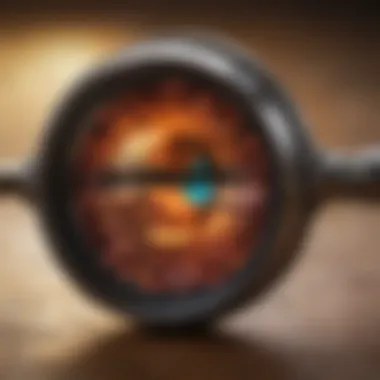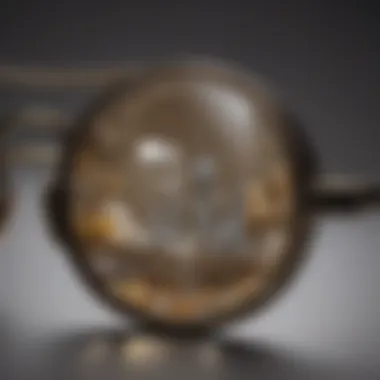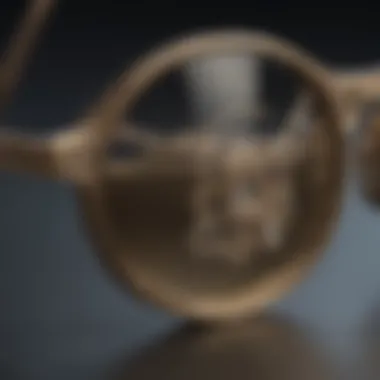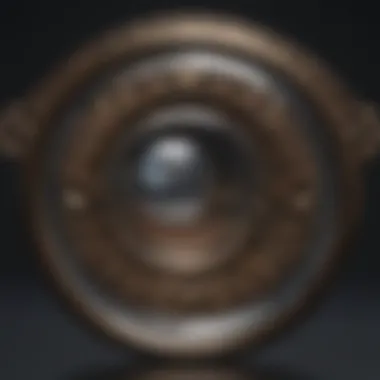Unlocking the Intricacies of Jewelers Loupe Glasses: A Magnifying Perspective


Rock and Fossil Identification
Jewelers loupe glasses offer a unique perspective into the intricate world of rocks and fossils. These specialized magnifying tools provide rock and fossil collectors with the ability to examine minute details and characteristics that may go unnoticed by the naked eye. When exploring the realm of rock and fossil identification, enthusiasts can utilize jewelers loupe glasses to observe the types of rocks and fossils, such as igneous, sedimentary, and metamorphic rocks, as well as various fossil specimens. The lenses of these magnifying instruments reveal the fine textures, color variations, and intricate patterns that define each rock or fossil.
Characteristics to Look For
In the realm of rock and fossil identification, certain key characteristics are crucial for accurate classification and understanding. Through the use of jewelers loupe glasses, collectors can meticulously observe features like crystal structures, fossil imprints, mineral composition, and any unique or rare attributes present in the specimen. These distinctive characteristics unlock a deeper understanding of the geological history and formation process behind each rock or fossil, providing valuable insights into the Earth's intricate makeup and evolution.
Tools for Identification
Jewelers loupe glasses stand out as indispensable tools for rock and fossil identification due to their exceptional magnification capabilities. These tools typically come with various magnification levels, allowing collectors to zoom in on specific details with precision. Additionally, some jewelers loupe glasses are equipped with built-in LED lights, enhancing visibility and enabling collectors to examine rocks and fossils even in dimly lit conditions. By leveraging these advanced magnification tools, rock and fossil enthusiasts can elevate their identification skills and gain a deeper appreciation for the intricate details hidden within each specimen.
Introduction to Jewelers Loupe Glasses
In the vast universe of jewelry and gemology, the humble jewelers loupe glasses stand as indispensable tools of magnification and precision. These miniature optical devices, often no larger than a pocket pen, hold the power to unveil the hidden intricacies of gemstones, metals, and craftsmanship. The significance of understanding and utilizing jewelers loupe glasses cannot be overstated, as they serve as the gateway to a microscopic world that defines the very essence of jewelry evaluation.
One of the key elements of jewelers loupe glasses lies in their ability to provide unparalleled clarity and detail at magnification levels that exceed the naked eye's limitations. By allowing users to zoom in on minute features such as inclusions, imperfections, and intricacies of jewelry pieces, loupe glasses enable gemologists, jewelry appraisers, and enthusiasts to conduct thorough examinations with precision and accuracy. The magnification power of loupe glasses plays a crucial role in determining the quality and value of gemstones, making them a vital instrument in the assessment and appreciation of jewelry.
Moreover, the ergonomic design of jewelers loupe glasses enhances the user experience, providing a comfortable grip and adjustable focal length that cater to individual preferences and requirements. The lightweight yet sturdy construction of loupe glasses ensures prolonged usage without causing strain or discomfort, allowing users to focus on the intricate details of gemstones and metals without distraction. Furthermore, the variety of optical features integrated into loupe glasses, such as specialized lens materials and construction design, contribute to the clarity and precision essential for gemstone inspection, craftsmanship evaluation, and horological assessments.
As we embark on this journey to explore the world of jewelers loupe glasses, we delve into a realm where precision meets magnification, unveiling a treasure trove of insights and revelations that enrich our understanding of jewelry and gemology. Through the lens of loupe glasses, we peer into a realm where beauty and intricacy coalesce, shedding light on the secrets that lie beneath the surface of precious gemstones and exquisite craftsmanship.
Understanding Loupe Glasses
Understanding Loupe Glasses is crucial in this article as it serves as the foundation for the detailed exploration of jewelers loupe glasses. By delving into the nuances of loupe glasses, readers can grasp the significance of these tools in the realms of gemology and jewelry craftsmanship. This section sheds light on the essential elements, benefits, and key considerations surrounding Understanding Loupe Glasses, providing a comprehensive understanding for enthusiasts and professionals alike.
Definition and Functionality
Magnification Levels
Magnification Levels are a critical aspect when it comes to loupe glasses. The level of magnification determines the tool's capacity to reveal intricate details that are otherwise invisible to the naked eye. In this article, the discussion of Magnification Levels emphasizes their pivotal role in gemstone inspection and jewelry evaluation. The ability to zoom in at specific ratios, such as 10x, 20x, or even higher, enables jewelers to conduct precise examinations, making Magnification Levels an indispensable feature of loupe glasses. The unique characteristic of Magnification Levels lies in their capability to unveil microscopic imperfections, facilitating accurate assessments within the jewelry industry.
Optical Features
Optical Features encompass the lens quality, coatings, and overall design that contribute to the functionality of loupe glasses. These features play a vital role in ensuring clear and distortion-free magnification, enhancing the user experience. In the context of this article, Optical Features are highlighted for their ability to optimize visual clarity and detail resolution. The inclusion of anti-reflective coatings, anti-scratch properties, and color correction mechanisms enhances the performance of loupe glasses, making them a preferred choice for professionals in gemology and jewelry appraisal. The advantage of Optical Features lies in their potential to provide a superior viewing experience, minimizing distortions and maximizing visibility for precise examinations.


Types of Loupe Glasses
Triplet Loupes
Triplet Loupes represent a category of loupe glasses known for their three-lens construction, which eliminates image distortions and color errors. These loupe glasses offer exceptional clarity and color accuracy, making them a popular choice among gemologists and jewelers. In this article, the focus on Triplet Loupes underscores their superior optical quality, enabling users to discern minute details with unparalleled precision. The distinctive feature of Triplet Loupes lies in their ability to provide crystal-clear magnification, enhancing the user's ability to identify gemstone characteristics and flaws effectively.
Quadruplet Loupes
Quadruplet Loupes stand out for their four-lens design, which enhances magnification power and image sharpness. These loupe glasses are favored for their advanced optical performance, delivering enhanced resolution for detailed examinations. Within this article, Quadruplet Loupes are showcased for their ability to reveal intricate features with exceptional clarity, making them a preferred choice for professionals requiring high-resolution magnification. The unique feature of Quadruplet Loupes lies in their ability to provide superior image sharpness and detail definition, catering to the stringent requirements of gemstone inspection and craftsmanship evaluation.
Bel
OMO Loupes
BelOMO Loupes are renowned for their precision engineering and high-quality optics, making them a desirable option for professionals in the jewelry industry. The exceptional design and construction of BelOMO Loupes ensure superior magnification performance and durability. In the context of this article, BelOMO Loupes are highlighted for their reliability and consistency in providing clear, distortion-free magnification. The unique feature of BelOMO Loupes lies in their robust build and optical precision, offering users a dependable tool for conducting intricate inspections and evaluations.
Quality Indicators
Lens Materials
Lens Materials play a fundamental role in determining the optical quality and durability of loupe glasses. The choice of lens materials, such as optical glass or plastic, influences the clarity and color fidelity of magnified images. Within this article, the focus on Lens Materials underscores their significance in maintaining optical excellence and longevity. Opting for high-quality lens materials ensures minimal distortions and maximum light transmission, essential for accurate gemstone examinations and craftsmanship assessments. The advantage of Lens Materials lies in their ability to provide superior optical performance and longevity, making them a prudent investment for professionals reliant on precise magnification.
Construction Design
Construction Design encompasses the structural composition and ergonomics of loupe glasses, contributing to user comfort and operational efficiency. A well-designed construction ensures a secure grip, adjustable focal length, and reliable performance. In the context of this article, Construction Design is emphasized for its role in enhancing user experience and long-term usability. By prioritizing sturdiness, comfort, and functionality, loupe glasses with superior construction designs offer users a reliable tool for prolonged usage without compromising on quality. The advantage of Construction Design lies in its capacity to enhance user comfort, streamline operability, and ensure lasting durability, making it a critical aspect to consider when choosing loupe glasses.
Applications of Jewelers Loupe Glasses
In the realm of jewelry and gemology, the applications of jewelers loupe glasses hold a prominent position due to their unparalleled magnification and precision capabilities. These specialized tools are essential for examining minute details of gemstones and jewelry craftsmanship with utmost clarity and accuracy. By employing jewelers loupe glasses, professionals in the field can delve deep into the intricacies of gemstone inspection, jewelry evaluation, and watchmaking. The significance of utilizing loupe glasses lies in their ability to unveil the true essence and intricacies of precious stones, metals, and intricate designs, enabling gemologists, jewelers, and watchmakers to assess quality, craftsmanship, and authenticity with precision and detail.
Gemstone Inspection
Clarity Grading
Clarity grading within gemstone inspection is a critical aspect that plays a pivotal role in determining the quality and value of a gemstone. By evaluating the presence of inclusions and assessing the overall clarity, gemologists can assign a grade to the stone, indicating its purity and visual appeal. The utilization of jewelers loupe glasses enhances the accuracy of clarity grading by allowing professionals to observe even the tiniest imperfections within the gemstone, which can significantly impact its overall value. The unique feature of clarity grading lies in its ability to provide a standardized method for comparing gemstones based on their clarity levels, offering a clear benchmark for consumers and traders alike.


Inclusion Analysis
Inclusion analysis complements clarity grading by focusing on the internal characteristics of a gemstone, such as fractures, minerals, or gas bubbles. This analytical process aids in identifying natural features and determining the gemstone's origin or treatment history. With jewelers loupe glasses, gemologists can scrutinize these inclusions with precision and detail, unveiling the story encapsulated within the stone. Despite its advantages in providing valuable insights into a gemstone's formation and authenticity, inclusion analysis also poses challenges in differentiating between natural inclusions and artificial enhancements, requiring expert knowledge and experience to interpret the findings accurately.
Jewelry Evaluation
Metal Testing
Metal testing is a fundamental aspect of jewelry evaluation that involves assessing the purity and composition of precious metals used in jewelry making. By conducting metal testing with the aid of loupe glasses, jewelers can verify the authenticity of metals such as gold, silver, or platinum, confirming their quality and value. The key characteristic of metal testing lies in its ability to provide reassurance to buyers regarding the metal's genuineness and quality, instilling trust and confidence in the jewelry piece. Despite its benefits in ensuring transparency and authenticity, metal testing may pose challenges in detecting sophisticated counterfeit metals or plating techniques, necessitating advanced analytical methods for comprehensive metal verification.
Craftsmanship Assessment
Craftsmanship assessment entails evaluating the intricate details and precision of jewelry fabrication, including setting styles, engraving techniques, and overall design aesthetics. With the aid of loupe glasses, jewelers can meticulously inspect the craftsmanship of a piece, appreciating the skill and artistry involved in its creation. The unique feature of craftsmanship assessment lies in its ability to unveil the artisan's proficiency, attention to detail, and passion, reflecting the heritage and artisanship embodied in each piece of jewelry. While craftsmanship assessment celebrates the artistry and intricacy of jewelry making, it also requires expertise and discernment to differentiate between mass-produced items and handcrafted masterpieces, enhancing the value and desirability of artisanal jewelry.
Watchmaking and Horology
Movement Examination
Choosing the Right Loupe Glasses
When delving into the intricate world of jewelers loupe glasses, understanding the significance of selecting the right loupe glasses becomes paramount. The choice of loupe glasses can significantly impact the quality of examination and assessment in the realms of gemology and jewelry craftsmanship. By carefully considering specific elements such as magnification power, lighting mechanisms, ergonomic design, and brand comparisons, individuals can enhance their precision and detail in inspecting gemstones, metals, and intricate designs.
Factors to Consider
Magnification Power
Magnification power is a crucial aspect to contemplate when choosing the right loupe glasses. The level of magnification determines the ability to view minute details with accuracy, making it instrumental in gemstone inspection or evaluating craftsmanship. Opting for loupe glasses with adjustable magnification settings provides versatility, allowing for a tailored approach to various tasks. While higher magnification offers intricate detail, lower magnification can be more practical for broader views, emphasizing the need for a balance depending on the specific needs of the user.
Lighting Mechanisms
In the realm of loupe glasses, lighting mechanisms play a vital role in enhancing visibility and precision during examination. Integrated LED lights or adjustable lighting sources help illuminate the subject, minimizing shadows and providing optimal viewing conditions. The inclusion of built-in lighting mechanisms ensures consistent brightness, facilitating accurate assessments of gemstone clarity, material composition, and craftsmanship details. However, it is crucial to evaluate the type of lighting used, as overly harsh lighting can distort colors or create reflective glare, affecting the overall viewing experience.
Ergonomic Design
Comfortable Grip


The ergonomic design of loupe glasses is more than mere aesthetics; it directly impacts user comfort and operational efficiency. Choosing loupe glasses with a comfortable grip minimizes hand fatigue during prolonged use, allowing for steady handling and precise adjustments. A textured or rubberized grip enhances control, reducing the risk of slippage and ensuring a secure hold while examining intricate details. Comfortable grips provide not only tactile satisfaction but also practical functionality, creating a seamless experience for users requiring extended periods of examination.
Adjustable Focal Length
The ability to adjust the focal length of loupe glasses adds a layer of customization that can enhance the user experience. By modifying the focal point, individuals can fine-tune the focus on specific details, achieving optimal clarity and sharpness in their observations. Adjustable focal length empowers users to adapt to varying distances between the loupe and the subject, accommodating different inspection requirements with precision. This feature allows for versatile usage across different tasks, from detailed gemstone analysis to assessing intricate engravings with ease.
Brand Comparisons
Bausch & Lomb
Bausch & Lomb has established itself as a reputable brand in the realm of loupe glasses, known for its commitment to optical precision and ergonomic design. The key characteristic of Bausch & Lomb loupe glasses lies in their optical clarity and durability, offering users reliable magnification for intricate tasks. The brand's lenses are crafted from high-quality materials to ensure distortion-free viewing, elevating the examination experience for gemologists and jewelry enthusiasts alike.
Bel
OMO BelOMO stands out in the loupe glasses market for its emphasis on optical performance and affordability. The brand's loupe glasses feature superior lens coatings that enhance image brightness and clarity, making them ideal for detailed inspections and grading. BelOMO's commitment to balancing quality and cost-effectiveness appeals to users seeking reliable magnification without compromising on visual acuity or durability.
Eschenbach
Eschenbach's loupe glasses exemplify precision engineering and versatility, catering to professionals and hobbyists alike. The brand's loupe glasses prioritize ergonomic design elements, such as adjustable eyepieces and comfortable grip features, for optimal user experience. Eschenbach's commitment to innovation is evident in its range of magnification options and lens technologies, offering users a comprehensive selection to align with their specific inspection needs.
Maintaining and Caring for Loupe Glasses
In the realm of jewelry and gemology, the maintenance and care of loupe glasses are paramount to ensure their longevity and optimal performance. Proper maintenance not only extends the lifespan of these precision tools but also guarantees the accuracy of examinations. Loupe glasses, with their intricate lenses and delicate construction, require specific attention to detail when it comes to upkeep.
Cleaning Procedures
Proper Storage:
Proper storage of loupe glasses is crucial in preserving their quality and functionality. Storing them in a designated case or pouch helps prevent dust accumulation and minimizes the risk of scratches on the lenses. A suitable storage solution not only protects the lenses from external damage but also ensures ease of access when needed. Maintaining a consistent storage routine enhances the lifespan of the loupe glasses and safeguards their precision capabilities.
Lens Maintenance:
The maintenance of the lenses on loupe glasses is a critical aspect of caring for these specialized tools. Regularly cleaning the lenses with a soft microfiber cloth and gentle lens solution helps eradicate smudges and debris, ensuring clear vision during examinations. Proper lens maintenance not only improves visibility but also enhances the accuracy of observations. Additionally, avoiding harsh cleaning materials and abrasive substances is essential to prevent scratches and maintain the transparency of the lenses over time.
Handling Precautions
Avoiding Scratches:
Preventing scratches on the lenses of loupe glasses is vital for sustaining their effectiveness. Handling the glasses with care, avoiding contact with rough surfaces, and storing them properly contribute to safeguarding the lenses from scratches. Opting for lens protectors or covers when not in use further minimizes the risk of damage. By prioritizing scratch prevention, users can uphold the optical integrity of the loupe glasses and ensure consistent performance.
Preventing Dust Accumulation:
Effective dust prevention measures are imperative for maintaining the clarity of loupe glasses. Regular dusting with a gentle brush or compressed air can help reduce dust buildup on the lenses and other parts of the glasses. Storing the glasses in a clean and dust-free environment when not in use also aids in preventing excessive accumulation. Managing dust proactively not only enhances the visual inspection experience but also contributes to prolonging the lifespan of loupe glasses.







